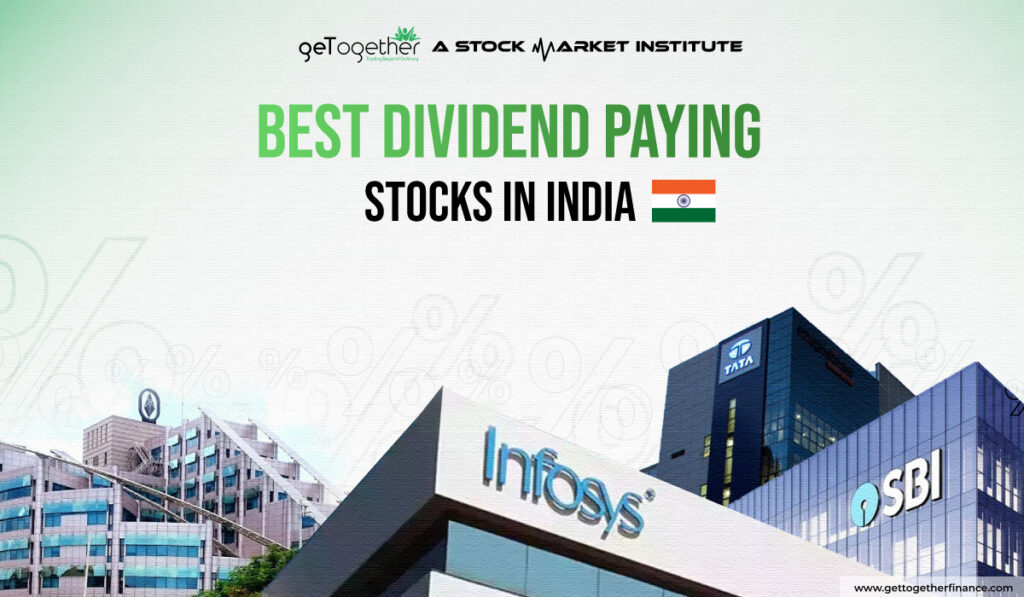Best Dividend Paying Stocks in India


Table of Contents
ToggleIntroduction:
Dividend-paying stocks can be an attractive investment option for investors seeking a regular income stream. In India, several high-quality stocks offer attractive dividend yields. This blog post will explore the highest dividend-paying stocks in India, highlighting their potential for generating passive income.
We will also discuss the taxation of dividends, factors to consider before investing in dividend-paying stocks and answer some frequently asked questions.
Highest dividend paying stocks in India
Investors should consider the dividend yield and the company’s financial stability when looking for the highest dividend-paying stocks in India.
Here are the top 10 highest dividend-paying stocks in India for 2024

Investing in the highest dividend-paying stocks in India can be an attractive strategy for investors seeking stable income alongside potential capital appreciation. In India, several companies stand out for their consistent dividend payments and strong financial performance, making them desirable options for dividend-focused investors.
- Reliance Industries Limited (RIL): RIL is one of India’s largest conglomerates with interests in petrochemicals, refining, oil & gas exploration, telecommunications, and retail. The company has a track record of consistent dividend payments fueled by its robust financial performance and diversified business model.
- Hindustan Unilever Limited (HUL): HUL is a leading fast-moving consumer goods (FMCG) company in India, offering a wide range of products including home care, personal care, and food & beverages. The company has a strong market presence, brand recognition, and a history of rewarding shareholders through consistent dividend payouts.
- Infosys Limited: Infosys is a global leader in technology services and consulting, providing solutions in areas such as software development, IT outsourcing, and digital transformation. The company has a history of stable dividend payments backed by its strong financial position and steady revenue growth.
- Tata Consultancy Services (TCS): TCS is another prominent player in the Indian IT industry, offering a comprehensive range of services including IT consulting, software development, and business process outsourcing. The company has a solid track record of dividend payments, supported by its strong market position and consistent profitability.
- State Bank of India (SBI): As India’s largest bank, SBI commands a significant presence in the country’s banking and financial services sector. Despite facing challenges in a competitive banking landscape, SBI has maintained a consistent dividend payout ratio, reflecting its commitment to shareholders and stable earnings.
- Coal India Limited: Coal India is the world’s largest coal mining company, playing a crucial role in India’s energy sector. Despite facing challenges such as environmental concerns and competition from renewable energy sources, the company has a history of rewarding shareholders with consistent dividend payments. It is one of the highest dividend-paying stocks in India in 2024.
- ITC Limited: ITC is a diversified conglomerate with business interests in FMCG, hotels, paperboards & packaging, and agri-business. The company has a strong dividend payout track record, supported by its leading market positions in several key business segments.
- Oil and Natural Gas Corporation (ONGC): ONGC is India’s largest oil and gas exploration and production company, with significant domestic and international operations. Despite volatility in global oil prices and regulatory challenges, ONGC has consistently paid dividends, reflecting its stable earnings and strong cash flow generation.
- Power Grid Corporation of India Limited (POWERGRID): POWERGRID is a state-owned electric utility company engaged in the transmission of power across various regions in India. The company operates a vast network of transmission lines and substations, playing a critical role in ensuring reliable electricity supply nationwide.
- Asian Paints Limited: Asian Paints is India’s largest paint company, offering a wide range of decorative and industrial coatings. The company has established itself as a market leader through its strong brand presence, extensive distribution network, and innovative product offerings.
Investors should conduct thorough research and consider various factors such as financial performance, industry trends, and macroeconomic conditions before investing in dividend-paying stocks. Additionally, diversification across multiple stocks and sectors can help mitigate risks associated with individual companies.
Also Read: What is a holding Company?
How Does Taxation of Dividends Work in India?

In India, dividends are subject to taxation based on the type of dividend received. There are two types of dividends: qualified dividends and ordinary dividends.
Qualified Dividend
Qualified dividends are those received from domestic companies listed on recognized stock exchanges. These dividends are subject to a lower tax rate.
- Taxation of Qualified Dividend
For individuals, qualified dividends are currently taxed at a concessional rate of 10% if the total dividend income exceeds a certain threshold. However, it’s essential to consult with a tax advisor for the latest regulations and thresholds.
- Tax on Long-Term Capital Gain (LTCG)
In addition to dividends, long-term capital gains (LTCG) arising from the sale of shares are also subject to taxation. The tax rate for LTCG is currently 10% if the gains exceed a specific threshold.
Ordinary Dividend
Ordinary dividends are those received from foreign companies, private companies, or companies not listed on recognized stock exchanges. These dividends are subject to the individual’s applicable income tax slab rate.
- Taxation of Ordinary Dividends
The taxation of ordinary dividends follows the regular income tax slab rates applicable to the individual receiving the dividend. It is important to consider the tax implications before investing in dividend-paying stocks.
Factors To Check Before Investing In Dividend-paying Stocks
Before investing in the highest dividend-paying stocks in India, it is crucial to consider the following factors. These factors can help you assess the sustainability and potential growth of the dividend payments. Here are some additional factors to consider:
- Dividend Growth: Evaluate the company’s track record of increasing dividend payments over time. Consistent dividend growth indicates a company’s ability to generate stable earnings and return profits to shareholders.
- Industry and Market Conditions: Consider the industry or sector in which the company operates. Certain industries, such as utilities and consumer staples, are known for their stable and consistent dividend payments. Assess the industry’s growth prospects, competitive landscape, and regulatory environment.
- Management Quality: Evaluate the company’s management team and their track record of making prudent financial decisions. Look for management teams that prioritize shareholder value and have a history of successfully navigating challenging market conditions.
- Dividend Coverage: Analyze the company’s ability to cover its dividend payments with its earnings. A healthy dividend coverage ratio indicates that the company has sufficient earnings to sustain its dividend payments.
- Economic Conditions: Consider the macroeconomic factors that could impact the company’s business and its ability to generate consistent earnings. Factors such as interest rates, inflation, and overall market conditions can influence a company’s dividend-paying capacity.
- Competitive Advantage: Assess whether the company has a competitive advantage or a unique position in its industry. Companies with a durable competitive advantage are more likely to generate stable earnings and sustain their dividend payments over the long term.
- Dividend Reinvestment Plans (DRIPs): Check if the company offers a Dividend Reinvestment Plan, which allows shareholders to reinvest their dividends to purchase additional shares without incurring transaction costs. DRIPs can enhance the compounding effect of dividends over time.
- Risk Assessment: Consider the overall risk profile of the company and evaluate any potential risks that could impact its ability to pay dividends. Factors such as regulatory risks, technological disruptions, and changing consumer preferences should be taken into account.
- Dividend History: Evaluate the company’s track record of consistently paying dividends over the years.
- Dividend Yield: Compare the dividend yield of different stocks to identify the ones with higher yields.
- Dividend Payout Ratio: Analyze the company’s dividend payout ratio to ensure it is sustainable and not too high. The dividend payout ratio measures the proportion of earnings that a company distributes as dividends. A sustainable dividend payout ratio is typically below 60-70% of earnings, as it allows the company to retain sufficient funds for reinvestment and future growth.
- Sector Outlook: Consider the prospects of the industry or sector in which the company operates.
- Company’s Financial Health: Assess the overall financial health of the company by analyzing its balance sheet, income statement, and cash flow statement. Look for indicators such as low debt levels, steady revenue growth, and positive cash flow generation. Assess the company’s financial health, profitability, and ability to sustain dividend payments.
To Sum it Up!
Investing in the highest dividend-paying stocks in India can be an excellent strategy for generating passive income. While focusing on Blue Chip stocks is fine, you can also focus on the highest dividend-paying penny stocks in India. To identify the best stocks, you can analyze factors like dividend history, financial stability, and taxation. However, conducting thorough research and seeking professional advice before making any investment decisions is always advisable.
FAQ
Which are the top dividend yield stocks in India?
The highest dividend-paying stocks in India include Indian Oil, Vedanta, Coal India Limited, ITC & Reliance Industries Limited, among others. These stocks have consistently provided attractive dividend yields to investors.
Is it compulsory for a company to give dividends to investors?
No, a company doesn’t need to give dividends to investors. The decision to declare and distribute dividends depends on various factors, including the company’s financial performance, cash flow, and growth plans.
How many times can a company announce a dividend?
A company can announce dividends multiple times in a year. Dividends can be declared as interim dividends, which are paid during the financial year, or as final dividends, which are announced at the end of the financial year.
What is the ex-date?
The ex-date, or ex-dividend date, is the date on which a stock begins trading without the dividend. Investors who purchase the stock on or after the ex-date are not entitled to receive the upcoming dividend payment.
What is an interim dividend?
An interim dividend is a dividend paid by a company during the financial year, typically before the annual financial statements are finalized. It is usually based on the company’s interim financial results.



 Facebook
Facebook Instagram
Instagram Youtube
Youtube
